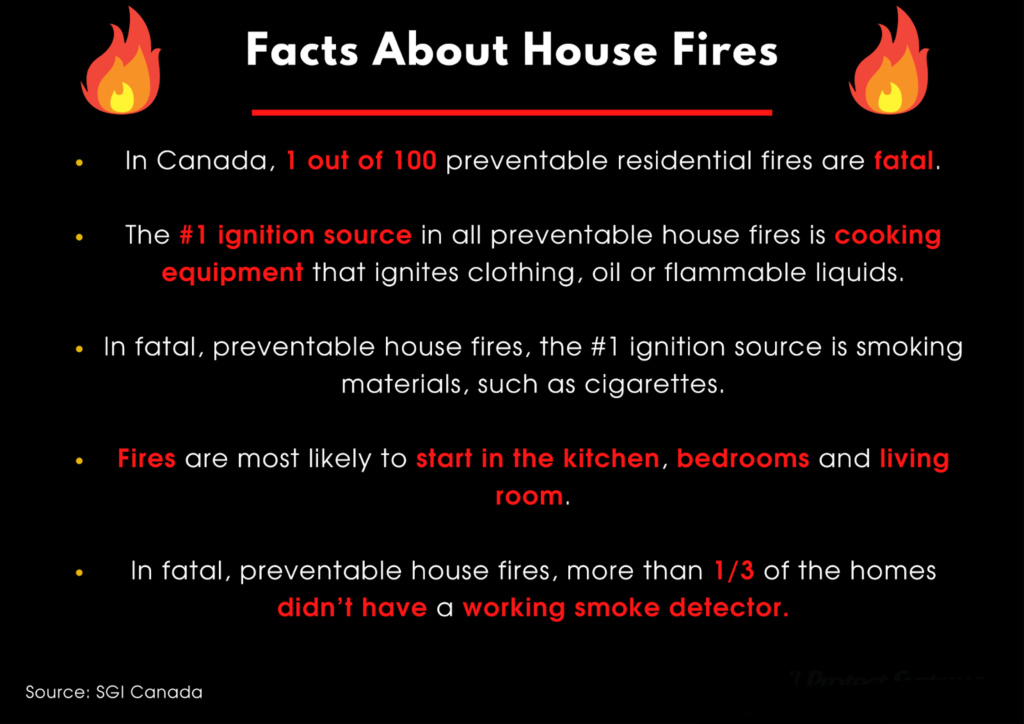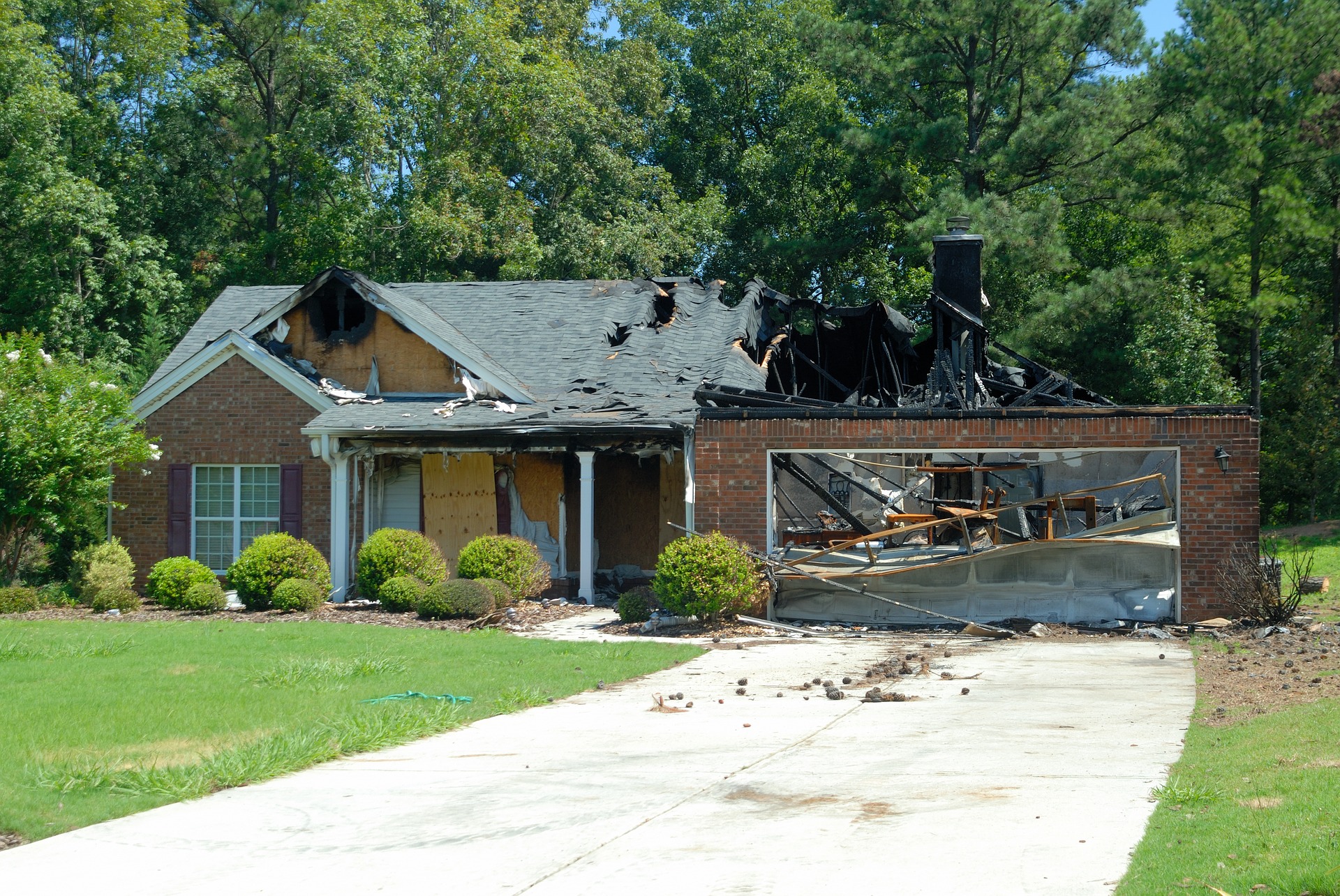Do you have a fire prevention plan for your home?
If you don’t, it’s high time to invest in fire prevention measures and bring your house up to OHSA standards.
To give you an idea of the need for better fire safety mechanisms in residential spaces here’s a brief summary of the current state of affairs and general home fire things to know:

So, what are some easy, hassle-free ways to fire-proof your home?
Let’s examine our top five recommendations.
Recommendation #1 Conduct a Home Fire-Proof Assessment
Do you know that there are on average 24,000 residential fires every year across Canada? On top of that, there are about 3,048 associated injuries and an estimated 377 corresponding fatalities.
These are worrying figures indeed. But what’s even more concerning are the people who are ignorant of the fire readiness (or lack) of their homes.
That’s why for us, step 1 in the fire prevention plan for your home should be to conduct an in-depth fire-proof assessment. You will only know for sure how safe your house is after a comprehensive evaluation from fire specialists.
Most fires can be prevented if residents are aware of the potentially hazardous issues and rectify them early on. With specialists such as NuTech Fire Prevention only one phone call away, don’t wait any longer to book a fire system inspection.
Recommendation #2 Mount Fire Extinguishers Around the House
Fire extinguishers aren’t created equal. They are designed with a specific fire in mind. As fire specialists, we advise all our clients to invest in several fire extinguishers for their home.
A couple of fire extinguisher suggestions for your home are:
- Water-based extinguishers because they are capable of putting out Class A fires that involve wood, plastic, paper, rubber and cloth.
- If you use gas in the home we suggest getting carbon dioxide-based fire extinguishers/dry chemical fire extinguishers as they are capable of extinguishing Class B fires which generally have as an ignition source gas, oil, or paint.
- If you work with power tools, make sure you have a liquid-based fire extinguisher/carbon dioxide fire extinguisher somewhere in the garage.
- For your kitchen, you’ll want a wet chemical fire extinguisher as it can easily douse Class K fires that are caused by hot oil, grease or fat.
If you’re still not sure which fire extinguisher to get, you can consult one of our fire experts. We would be happy to make additional suggestions.
Recommendation #3 Install Fire Sprinkler Systems
Has it ever occurred to you that a fire might break out in your home while you’re not there? It’s a scary thought indeed. But it’s not one you need to fear if you have a fire sprinkler system installed.
Fire sprinkler systems are great ideas for homes with invalids or elderly residents who may not be able to make a quick dash to the closest fire extinguisher.
The automatic nature of the fire sprinkler system will kick in as soon as a fire is detected. During your home assessment, the fire system expert will be able to make suitable recommendations of where the fire sprinkler system can be installed throughout your residence.
Recommendation #4 Invest in a Smoke Alarm
Do you currently have a smoke alarm installed in your home? Yes? No?
If yes, when was the last time it was serviced? Is it even functional? If you can’t answer any of these questions, it’s time to schedule your annual maintenance inspection
And if you don’t have a smoke alarm, it’s time to invest in one.
Research has shown us that in homes with smoke alarms, the number of fatalities during fire incidents is significantly much lower than in homes without such systems.
What you need to remember about smoke alarm installation is that this is a one-time installation that will only require one annual checkup. What might seem expensive at onset will prove to be an invaluable investment over the years. Look at smoke alarms as a type of home insurance if you’d like.
Recommendation #5 Clear Combustible Vegetation Around the House
What type of vegetation is around your property? Do you have flammable plants? Grasses? Piles of wood nearby? All these can be very dangerous.
You’ll want to ensure you create a line of defense around your property that acts as a fire break in case of any rogue fires.
You’ll also want to make sure that the material that makes up your driveway and encircles your house is of crushed stone.
It’s a good idea to keep your lawn neat and trimmed and no higher than 10cm. It should also be well-hydrated particularly during the hotter months of the year.
Bonus Recommendation: Fire Doors Can Be Game-Changing
According to SGI Canada, the rooms in which fire is most likely to start are the living room, the bedrooms, and the kitchen.
With that said, what can be done to contain fires in these areas should it break out? Well, for kitchens we suggest fire doors.
Safeopedia.com defines fire doors as:
“…a type of door that has been built to withstand direct exposure to fire for an extended period without allowing the fire to move to the other side of the door.”
These purpose-built doors act as both heat shields and inhibitors against the spread of fire. OSHA standards stipulate that each emergency exit in your home or place of residence should be protected by a fire door.
The Bottom Line
There can be no doubt about the fact that prevention is better than cure. We encourage homeowners and landlords to be proactive in their efforts to fire-proof their homes.
Making sure you’re one step ahead gives you peace of mind and potentially provides you with higher chances of survival in the event of a fire incident.
If you’re in Ontario and would like to discuss your fire prevention plan or the OSHA standards our technicians at NuTech Fire Prevention are always happy to help.
We pride ourselves on being fire specialists able to service, install, and maintain fire alarm systems, fire warning systems, fire extinguishers, emergency lighting, exit lighting, and sprinkler systems.
Request a free quote today.

